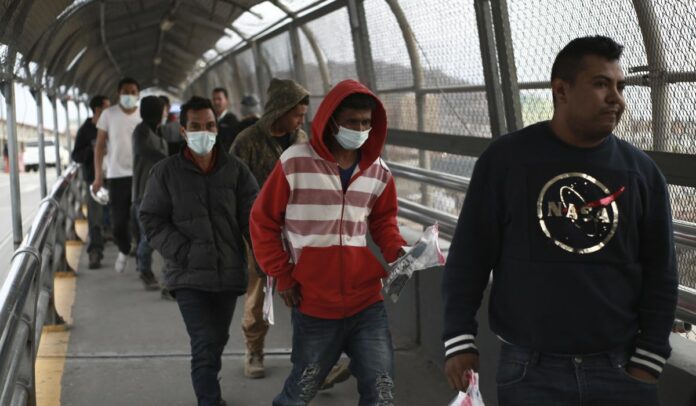A coronavirus mask mandate snared a migrant smuggler in Texas this month after he was forced to leave one of his mask-less victims in a car while he went into a store for cigarettes, giving the man a chance to signal for help.
Immigration and Customs Enforcement agents say the accused smuggler had been holding several migrants at gunpoint to try to extort extra payments from them before releasing them, but his need for a smoke got the better of him.
Elsewhere in Texas, Border Patrol agents say a woman tried to sneak through a highway checkpoint with a bogus ID and a coronavirus mask to hide her face, hoping the agents wouldn’t unmask her.
As COVID-19 cases surge across the border, new questions are being asked about the nexus of immigration and the spread of the coronavirus.
Several Republican members of Congress have suggested that illegal immigrants and legal border crossers might be responsible for part of the spike in cases in Texas, California and Arizona, which are among the worst-hit states in the current wave.
Acting Homeland Security Secretary Chad Wolf, meanwhile, has said U.S. citizens and legal permanent residents in northern Mexico are fleeing overrun hospitals south of the border and heading north for care in the U.S. That is contributing to higher numbers in border states.
Immigration rights activists say there is no evidence to back up those claims. They say U.S. policies are making the situation in northern Mexico worse by invoking a part of public health law to immediately expel unauthorized border crossers and make asylum seekers wait in Mexico for their hearings.
The International Rescue Committee says that policy has contributed to a surge of COVID-19 cases in Mexico, where daily case and death tallies have doubled over the past month.
Administration officials say the expulsions have likely saved many lives in the U.S.
Mr. Trump invoked the public health law on March 21 to expel unauthorized border crossers. As of July 15, more than 88,000 people were blocked from entering the U.S. because of the law.
“If not for this effort, tens of thousands of aliens acting as potential carriers for the coronavirus would have continued to enter law enforcement facilities near the border in congregate settings, making our southwest border a major vein for coronavirus outbreak,” a senior administration official said.
The pandemic’s reach on migrants extends well beyond the border.
More than 1,500 Mexican immigrants in the U.S. have died from COVID-19, Jorge Islas, Mexico’s consular general in New York, wrote in a piece for El Universal. Most of those were in the New York area.
St. Patrick’s Cathedral held a goodbye ceremony this month for the remains of some 250 people, with urn-filled ashes that Mexican authorities flew back home.
More than 100 of the urns were destined for Puebla, which accounts for a large percentage of Mexicans working in service jobs in New York.
Illegal border crossings, which dipped dramatically in April, surged in May and again in June.
Migrants who were paying a few thousand dollars to smugglers in April now shell out $9,000 or more to get into the U.S., according to data tracked by The Washington Times.
That was the case for Maria Hernandez-Mejia, a Honduran woman snared at the checkpoint on Interstate 35 north of Laredo, Texas, on July 8.
She was a passenger in a car and was wearing a mask when the driver pulled up to the checkpoint. She handed over a Texas driver’s license but, when asked by agents to remove her mask so they could compare the photo, she refused.
Agents thought that was suspicious, so they sent the vehicle for a secondary inspection. According to court documents, they persuaded Ms. Hernandez-Mejia to admit the license wasn’t hers, that she was an illegal immigrant and that she was paying $9,000 to be smuggled to Los Angeles.
A day later, police in Pharr, Texas, got a tip that an illegal immigrant said he and others had been held at gunpoint by a smuggler demanding more money before releasing them.
Alonso Trejo-Padron, a Mexican, managed to phone in the alert after the accused smuggler, Baylee Lugo, went out for cigarettes and forced Mr. Trejo-Padron to accompany him, according to court documents.
When they arrived at the store, though, Mr. Trejo-Padron didn’t have a mask and Mr. Lugo had to leave him in the car — giving him a chance to flag down a woman outside the store who helped call police.
Homeland Security Investigations agents responded to the Red Roof Inn where Mr. Trejo-Padron said three other illegal immigrants were being held. When they arrived, they arrested Mr. Lugo and recovered the 9 mm gun that the migrants said he had been using to threaten them as he extorted them for more money.
One of the other migrants told agents that when Mr. Lugo realized the cops were on to him, he tried to give them the gun. When they refused, he hid it under the hotel bed mattress, and he and the migrants tried to hide under the covers.
Each migrant reported paying $4,000 for passage across the border and said Mr. Lugo was trying to demand thousands more to be paid directly to him.
Both cases came to light because the Department of Homeland Security referred them for prosecution and the Justice Department made cases out of them.
That is increasingly rare, according to data collected by the Transactional Records Access Clearinghouse at Syracuse University.
In February, Customs and Border Protection referred more than 7,700 cases for prosecution. In May, referrals had dropped to 1,649. In June, referrals slipped to 1,295, TRAC says — a drop of 83%. By contrast, the FBI’s referrals were down just 6%.






